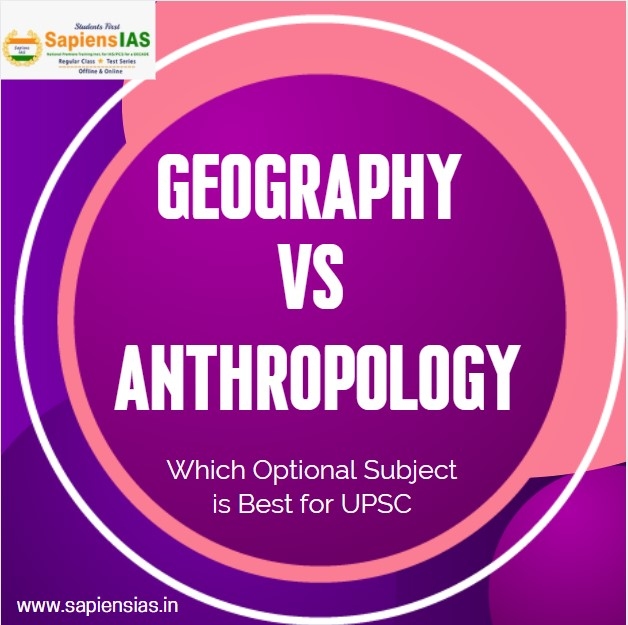Geography As An Optional
Stuck in geography vs. anthropology as optional subject? We will guide you to choose your choicest subject. If you are looking for ‘which is better optional anthropology or geography’, here you will get your answer.
Table of Contents
ToggleEvery year, numerous of students appear for IAS exam. When a student appear for the examination of UPSC (IAS, IPS etc.), it is essential to choose on optional subject. 500 marks out of a possible 2025 equals around a quarter of a marks. And 25% of your grade is based entirely on one subject, which should be one of your favorites. A genuinely intelligent individual would strive to not lose a single label.
All of the other sections are common, with the exception of General Studies, which has a limit of 1000 marks. This part isn’t difficult to crack. A wise choice of optional subject ensures that your interest in the subject is preserved and that you do not lose a single mark in it.
Civil services examinations have comprehensive syllabus and requires rigorous training and practice. The UPSC syllabus has a wide range and the facility of choosing optional subject comes at the stage of Mains stage. Although most of the subjects in the UPSC Civil Services Examination (CSE) Mains are compulsory and common to all aspirants, one subject can vary from candidate to candidate. The ‘optional subject’ is the name given to this subject.
Regardless of the graduation experience, aspirants are free to select their optional subject from a list given by UPSC based on their interests. There are 40+ subjects in the optional section in UPSC CSE Mains examination and a student generally chooses the subject as per their convenience and previous knowledge.
Geography and Anthropology are the two main subjects chosen by students. When it comes like geography vs. anthropology in mind, one should know ‘what is best optional between anthropology and geography’. Before you choose anthropology or geography, you should be clear about these subjects.
Geography As An Optional
The topic of geography is fascinating. It is easy to comprehend and replicate in the exam. It is a combination of scientific and social science knowledge. From the UPSC’s perspective, this topic has both advantages and disadvantages.
A major portion of the Geography syllabus, especially General Studies paper I, overlaps with the syllabus of the preliminary exams’ General Studies paper I & IV. As a result, learning Geography lets you prepare for both the prelims and the mains at the same time.
Reasons To Choose Geography
- The geography optional syllabus covers a wide range of topics rather than just physical geography, it aids in a comprehensive understanding of the country and its issues, as well as mental growth.
- Geography would be useful also in the UPSC personality test, as the panel can ask a question about the local geography of a candidate’s home town, such as soil, plants, rocks, and so on. Geography is a high-scoring subject since, unlike other humanities topics, it does not allow for much interpretation.
- There isn’t a lot of mugging up needed. Only concepts must be comprehended.
- There is no shortage of resources for Geography.
- Both in the prelims and the mains, it has a lot of overlap with General Studies.
Sign Up to Score Higher Better Faster
Anthropology As An Optional
Anthropology is likely the only optional in the UPSC Syllabus, and a significant portion of it has been eliminated. Due to the elimination of topics such as Development Anthropology, Ethnicity, Reproductive Biology, Twins, and others, it is hoped that the subject would once again be a common choice for the IAS exam, as it was a few years ago.
Some candidates choose anthropology as optional subject because there is less content to read in fields such as anthropological theory, research methods, and demography, among others.
Why Choose Anthropology
- In most cases, you will be asked clear questions.
- It scores higher than other humanities subjects because the response can be followed by diagrams and flowcharts, saving time while still being appealing.
- In comparison to other subjects, the anthropology optional syllabus is shorter.
- Students in science and engineering who want to take a subject other than their graduation subject should consider this choice.
- Anthropology’s past success has been consistent.
Which Optional Subject
There is no such thing as a “high-scoring optional subject” or a “safe option.” The pattern shifts yearly. What matters most is your enthusiasm for the topic and your level of confidence a student put in it.
The initial step in determining your optional subject is to review the UPSC’s syllabus for different optional subjects. The next move is to go through the UPSC anthropology previous years question papers. Most of the time, the optional subject for which you are most comfortable would be the best choice for you.
A student should brainstorm highly before choosing an optional subject. On an average, Geography is chosen by majority of candidates as an optional subject and Anthropology is preferred less relatively. Still, it depends on students’ choice to choose the subject.









